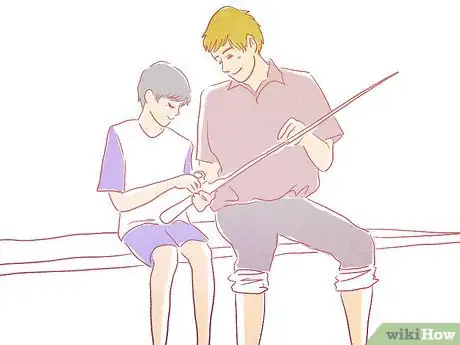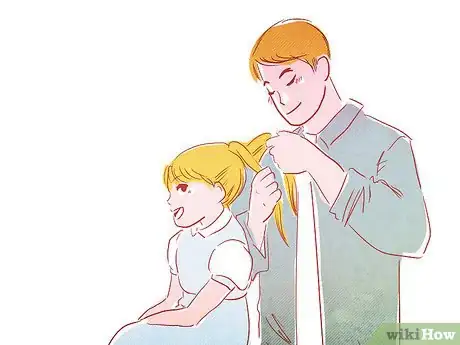This article was co-authored by Steven Hesky, PhD. Dr. Steven Hesky is a Licensed Clinical Psychologist with over 37 years of experience. He specializes in long-term psychotherapy with adults and adolescents. His training includes Freudian, Jungian, and Existential approaches to psychotherapy, hypnosis, family therapy, marriage counseling, and biofeedback. Dr. Hesky holds a BA in Philosophy from Lake Forest College and an MA and PhD in Existential Clinical Psychology from Duquesne University.
There are 8 references cited in this article, which can be found at the bottom of the page.
wikiHow marks an article as reader-approved once it receives enough positive feedback. This article received 12 testimonials and 100% of readers who voted found it helpful, earning it our reader-approved status.
This article has been viewed 395,245 times.
Being a stepparent can be both fulfilling and challenging. If you've married or partnered with a person who already has children, you have to consider them part of a package deal, to be loved, nurtured, and protected to the best of your ability. Being a good stepfather has all the elements of being a good father, as well as acknowledging that it takes time and willingness to establish your role as stepfather in a new family arrangement.
Steps
Establishing your role
-
1Beware that the children may also have their biological father as a father figure. Don't try to compete with the biological father.
-
2Be patient when waiting for your new stepchild to respond to your caring, affection, and love. Often, the child is deeply wounded by circumstances involving their biological mother and father and the breakdown of their primary, original family unit. For many, building a new relationship is threatening to them. Time is the best healer but so is keeping actively positive and supporting yourself whenever you're around the child.[1]
Spending time with your step-children
-
1Spend time with the stepchild in his or her activities. Helping with schoolwork, projects, and attending sporting events or clubs like scouting they're involved with will show them you're willing to support their efforts. The more involved you are, the sooner the child will accept you in your role of alternative dad and be grateful that you're a part of his or her life too.[2]
-
2Balance the time and gifts you give your own children with the stepchild. Both your own children and your stepchild are a part of your family now. Avoid playing favorites under any circumstances; each child is to be treated as equal, and no child deserves to be treated as an outcast.
- Keep a watchful eye on how your stepchild interacts with your own children, if you have any. Jealousy is toxic to any relationship. If this appears to be occurring, try to head it off immediately. To maintain a happy family atmosphere, step-sibling anger must be dealt with fairly and prudently.
- Never treat your stepchild like he or she is not worthy of your time or affection just because he or she is not your biological child.
- Never make your stepchild feel like you don’t care or like them, or that they are in the way of your relationship with their mother.
-
3Invite the stepchild to participate in your own activities. If you fish, golf, or do other hobby activities, where it is appropriate, take your stepchild along. Not only does this give the child a chance to see what you enjoy, but it gives his or her mother a break. On the other hand, never force the child to do what you've asked––if he or she shows a disinclination toward fishing or rewiring the house, don't force it. Given time and your enthusiasm, the child might come around to trying it. But if he or she is never interested, then that's just a reflection of his or her interests, not a reflection on you. Pushing the child to do things he or she hates just to try to prove you're buddies will backfire. Instead, keep looking for common ground until you do find an activity the child would like to share with you.
- Spend time with your stepchild and teach him or her ways to become a responsible adult.
- Show the child you're willing to help out in housework. It is important for children to understand that keeping a household is a family job, a shared household responsibility, and not just the mother's. Don't be old-fashioned, even if the child's real father is.
Communicating with your step-children
-
1Communicate clearly and calmly. Let your stepchild know that you are available to talk whenever needed and be a good listener when your stepchild does come to you for a chat. Be open-minded and accepting of difference, as the child has had different experiences before you came along. Make your own preferences known without being harsh or intimidating––always explain your actions and preferences with sound reasons.[3]
- Never let the only interaction you have with your stepchild that day be yelling and screaming. You should always try to focus on the positive things they do and not always the things they are doing wrong.
- Keep your negative opinions of the child's biological father to yourself. Unless you're asked directly, don't bring up your opinions of him in front of the children or anyone else. If you are asked directly, be circumspect and tactful, as there is often a risk of an emotional overflow. Each parent's parenting style is different and unless the father is not taking part in parenting at all or is abusive in any way, you don't need to pass judgment.
- Never argue with the child's mother in front of the child. Be especially careful about making derogatory remarks about her where the child may hear. The child will be highly alert to any disharmony, mostly due to a sense of protectiveness toward the mother and holding a strong hope that this new relationship will result in creating a happy family arrangement.
-
2Be openly caring. The child/ren will need your love and affection at all times, they will need you to be there whenever they need you, no matter what the situation. Moreover, they will need you to be the better parent at times, they will need you to stick up for them no matter what, and they will need you to give them a pass once in a while.[4]
- Be ready to listen to them and understand what they are going through or what they are trying to say.
- Give them your fatherly shoulder to cry on at times or even just a hug or a kiss on the forehead or just a simple "I love you".
Stepping back
-
1Respect the child's private space. Any child, from preteen through their teen years deserve a reasonable amount of privacy and private space, and unless there is serious concern about the child's behavior or activity, the more space they are given, the more trusted they will feel.[5]
-
2Raise the child in alignment with the child's mother's wishes, not contrary to them. This means having open lines of communication with the mother about her expectations and intentions for raising your stepchild, and having clarity on the direction both of you will take. As much as possible, defer to her preferences unless they are dangerous or threaten to destabilize the family or relationship the two of you have.[6]
- Respect the child's mother's disciplinary and homework regimens. Even if you think they may be out of line, don't raise this in front of the child or make passing remarks that undermine her. Instead, talk to her privately about your concerns and try to reach a compromise that benefits the child.
- Discuss decisions which affect your stepchild directly or indirectly with his or her mother. Don't sign the child up for a summer at a military academy or sports camp without talking it over with her. Don't buy the child firearms, fireworks or even seemingly harmless ones like paintball guns or BB guns without her knowledge and consent. Never take the child out on an ATV, snowmobile, micro-light or other potentially dangerous recreational vehicle without her express permission.
- Talk about computer games, video games, and other cultural influences with the child's mother. Social pressure will often press on mom to let the child do it, whatever "it" is, because everyone else is doing "it". Each family should have its own standards and ethical codes to live by. The child's mother needs your support and input on deciding whether to let the child have violent or graphic video games in the home, or allowing them to go to "R" rated movies with their friends.
- Understand that your spouse is a mother and cannot always be free to spend alone time with you. There will be times when she will have to help the child or spend time with the child when you would really like her to be spending time with you.
Being a great role model
-
1Help plan the future of the stepchild. It may fall on you to begin a savings plan for college expenses, the first car, and helping to find that first job.[7] Be actively involved in working out what is needed for the child's future, talking to the mother first and then including the child where appropriate.
-
2Be a good example to your stepchild. Smoking, excessive drinking, and recreational drugs have no place in a home with children in it. This may not be the politically correct position, but from the effects of secondhand smoke on young lungs, to the acceptance of illegal drugs as a "norm", these are not good behaviors to model for children. If you have problems with addiction to substances, seek help. If you must smoke, always smoke outdoors, away from the child.[8]
-
3Remember, being a step-dad is a leadership role as part of a team. Accept the unique qualities of each team member, the limitations, even the eccentricities. There will be good times, even great times, but there will be conflict, disagreements, and letdowns. Patience, love, and a sympathetic view should help you through these challenges. You are the adult, no matter what the situation, you should remember that, and that problems may seem huge, but often will be forgotten in tomorrows rush, or laughed about next year.[9]
- Be yourself. It is almost impossible to set up pretense of doing, being, enjoying, or acting in ways that are not you. You may impress your stepchild for a while, but the real you will emerge sooner or later.
- You chose to enter into a relationship with a woman with children, so you ultimately chose to be a role model and a parental figure to her child or children.
- It is a good idea to keep a good rapport with your stepchild's biological father, except in cases where he is not welcome in your stepchild's life. A large proportion of stepfathers are good friends with the biological fathers of their stepchildren––both men are acting in the best interest of the child and collaborate. If both men are reasonable, impasses are uncommon.
- Never pass up an opportunity to tell you stepchild that you love him or her.
-
4Try to forget that he/she is not your biological child. Sometimes always thinking about it would make you feel uneasy and unnatural around your child. Just treat him/her as you would your own child: if you love your spouse so much, why shouldn't you love her child?
Community Q&A
-
QuestionHow can l get my stepson to engage in communication and to want to spend time with me?
 Community AnswerIt takes time, but he will learn to trust and communicate with you if you are a good listener and non-judgemental. When he does talk to you, stop what you're doing, make eye contact and listen.
Community AnswerIt takes time, but he will learn to trust and communicate with you if you are a good listener and non-judgemental. When he does talk to you, stop what you're doing, make eye contact and listen. -
QuestionWhat can I do to be a better stepfather to a disobedient 16-year-old?
 Community AnswerFirst figure out the problem. Is she that way because she doesn't get much attention, is there something going on at school, or does she not know/understand the rules properly? Once you've found out the problem, try to fix it. Then treat her like your own. Bond with her, find her interests, and show her that you love her.
Community AnswerFirst figure out the problem. Is she that way because she doesn't get much attention, is there something going on at school, or does she not know/understand the rules properly? Once you've found out the problem, try to fix it. Then treat her like your own. Bond with her, find her interests, and show her that you love her. -
QuestionWhat should a stepchild me? My first name? Stepfather?
 Community AnswerIt's really up to you and the child to determine what you're both comfortable with. Many children call their stepparents by their first name. If you want something more familiar, you could go with "dad" or "pop" or some other variation on "father."
Community AnswerIt's really up to you and the child to determine what you're both comfortable with. Many children call their stepparents by their first name. If you want something more familiar, you could go with "dad" or "pop" or some other variation on "father."
Warnings
- Don't complain about every single thing your stepchild does. Remember that it’s not easy for this child to move into a new environment and to automatically learn to respect you.⧼thumbs_response⧽
- Never put your spouse in the spot to have to choose between you or her child/children. She will often choose her child over her adult relationship, meaning you will lose out. Even if she chooses you over her child, you both lose out by losing the child's respect and love.⧼thumbs_response⧽
- Do not think of your stepchildren as being brats or just naughty and as having no respect for you; try to see the situation from their point of view, through their hearts and eyes, especially when you know their history of disappointments and what and whom they expect you to be.⧼thumbs_response⧽
- You will find there are times when your step-children try your patience or test your loyalty against them or the mother. Then you have to be the adult and think before you speak; how you say it will affect your relationship forever.⧼thumbs_response⧽
- Never say "You should be more like your sibling/step-sibling" or compare them. Every child is a different human being with their own needs, talents, goals and personality. Take each of them for who they are and judge them in relation to their real abilities and talents. Learning something in their most difficult subject is a much bigger achievement than the latest gold star the kid who's talented in it got. Effort should count when judging results.⧼thumbs_response⧽
- Don't give them rewards for every routine chore and average behavior. They'll start doing it just for the reward and lose interest in their hobbies if you do too much rewarding. Save rewards for special achievements like grade level rises, extra special cleaning up, any time the kid's done something much better than usual.⧼thumbs_response⧽
- Never complain about your stepchildren to strangers. Just don't go there. Don't do this with your own children either. When you talk about your step-kids or your kids, put their best foot forward and talk about what you like about them. It reflects badly on you if they're that awful and implies you're not getting along well with your new partner.⧼thumbs_response⧽
- Becoming a stepfather puts you in a position of responsibility for protecting the child from a host of dangers. Be aware of the risks which the child faces and be on the lookout for dangers around the home. Small children suffer from terrible harm every day because of carelessness.⧼thumbs_response⧽
References
- ↑ https://www.allprodad.com/5-ways-to-be-a-great-stepdad/
- ↑ https://www.lifehack.org/articles/featured/becoming-a-great-step-dad.html
- ↑ https://www.familyeducation.com/life/relating-stepchildren/communicating-stepchildren
- ↑ https://www.mamamia.com.au/how-to-be-a-good-step-dad/
- ↑ https://www.iser.com/resources/good-stepfather.html
- ↑ https://kidshealth.org/en/parents/stepparent.html
- ↑ https://www.iser.com/resources/good-stepfather.html
- ↑ https://goodmenproject.com/featured-content/5-ways-set-good-example-kids-lbkr/
- ↑ http://fathers.com/s5-your-situation/c21-step-dad/the-effective-stepfather-a-check-list-to-live-by/
About This Article
Being a good stepfather can be a challenging and fulfilling role. At first, focus on spending quality time with your stepchildren doing things they love. This will help them to open up to you and trust you. Don’t worry if this takes longer than you expect, since it can be difficult for children to get used to a new parental figure. You should also listen to their thoughts and feelings and encourage them to share things with you. This will help strengthen your relationship and show them that you’re there to support them. For more tips, including how to balance your relationships with your stepchildren and your biological children, read on!












































































